
Around the bloc: Serbia to Use Joint Military and Police Teams to Curb Migrant Influx
The Serbian government steps up its efforts to secure its borders with Bulgaria and Macedonia against migrants and smugglers.
More...We kindly inform you that, as long as the subject affiliation of our 300.000+ articles is in progress, you might get unsufficient or no results on your third level or second level search. In this case, please broaden your search criteria.

The Serbian government steps up its efforts to secure its borders with Bulgaria and Macedonia against migrants and smugglers.
More...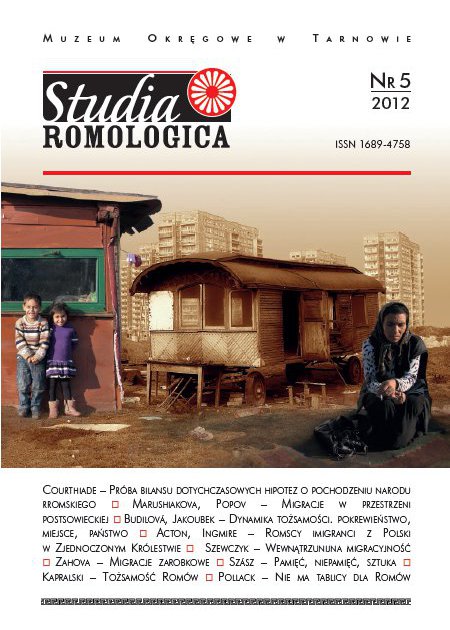
The article ‘Some aspects of migration of the Roma after the enlargement of the European Union’ deals with the problems arising in connection with the migration of the Roma in the EU after its enlargement in 2004 and 2007 by so-called ‘Eastern European countries’, which were quite numerous and are still inhabited by the Roma minority. The article focuses on an attempt to improve the living conditions of the Roma through EU legislation, including Council Directive 2000/43/EC of 29 June 2000 implementing the principle of equal treatment regardless of racial or ethnic origin, Council Directive No. 2000/78/WE of 27 November 2007 establishing a general framework for equal treatment in employment and occupation and - in particular - adopted by the European Parliament, „Resolution on the social situation of the Roma and their improved access to the labor market of the EU” in March 2009. The study is an attempt to confront the above-mentioned legal acts with the actual/real possibility of their implementation. The author draws attention to a number of problems in this area (lifestyle, internal diversity of Roma communities, the level of education, access to the labor market, the role of women), mainly due to the difference of the Roma minority culture and the difficulties associated with the integration in the societies of EU member states.
More...
The Balkan country bows to demands from Brussels and Washington for a more transparent legal system.
More...
At least 45 injured as protestors attack riot police.
More...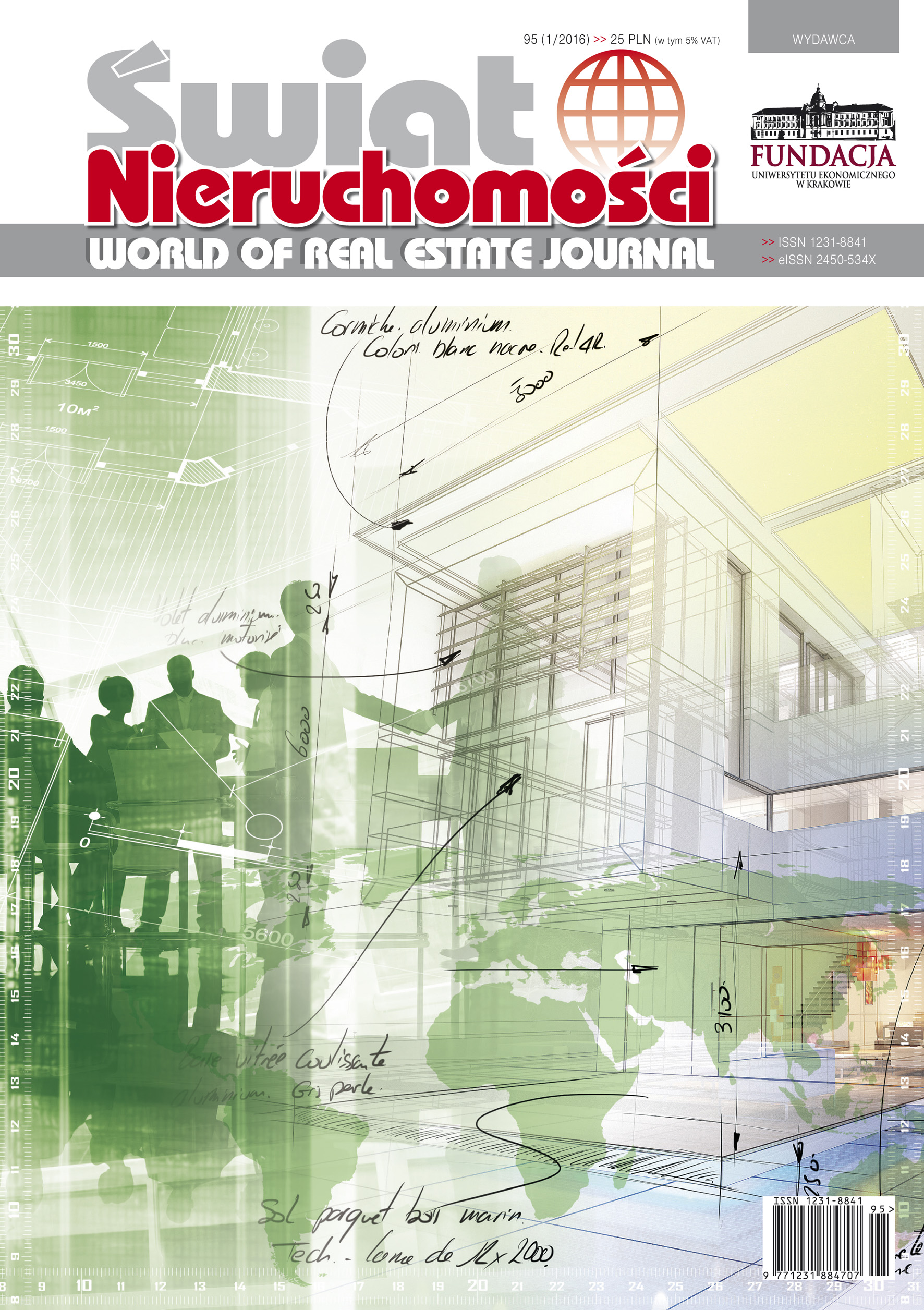
Public property management includes, among others, the control of the manner in which the real estate let into perpetual usufruct was developed. Besides the provisions of the acts and the rules of social interaction, an agreement appears to be a significant element shaping the content of the right of perpetual usufruct. The consequence of a failure to develop real estate let into perpetual usufruct may be imposing additional annual fees. In practice, this issue raises numerous problems and controversies, and it is also subject to non-uniform decisions.The research thesis of this article is that the current regulations regarding additional annual fees contained in the Real Estate Management Act are imprecise. The aim of the study is to analyse the problems relating to the imposition of additional annual fees. The analysis was carried out based on the results of the study of the process of imposing additional fees by the Municipality of Krakow in the years 2010-2014.
More...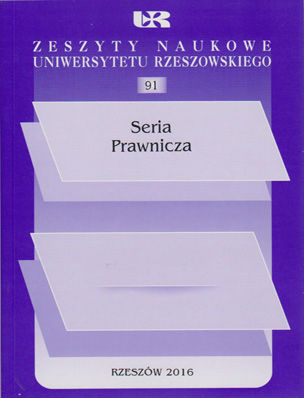
The Polish State, after the years of partitions after the World War I, beside the fight for borders,was forced to undertake some actions to unify law and administration of the lands that had been in different systems of the partitioning countries. One of the more difficult challenges was regulation of the territory of the former Austrian partition. Especially in Eastern Galicia, hardbitten in the World War I, the Polish-Ukrainian War, and the Polish-Bolshevik War. In the first days of November 1918 the Polish authorities in Warsaw delivered the authorities of the Austrian Empire their position to take over Galicia. On the territory, destroyed due to war actions, the Poles introduced new regulations and administration. It happened gradually, when fights moved eastward and peace conditions were introduced. On the turn of 1918/1919 the Chief of State Jozef Piłsudski issued first decrees that concerned organization of the administration, administration of justice, police, and finances on the territory of Galicia. In 1919 the first Polish Parliament – Sejm started its activity. Then the process of law unification started, concerning among others the lands of southeastern Poland. After the Polish-Bolshevik War, in 1921 the territory was divided into four provinces (Voivodeships): the Krakowskie Province, the Lwowskie Province, the Tarnopolskie Province, and Stanisławowskie Province. Provincial administration started their activity. In the years 1918–1922 the main legal and administrative structures of the State were shaped on the territory of southeastern Poland (the territory of the former Austrian partition).
More...
In interwar Poland incomes from service pays, retirement pensions and remunerations for hired labour were included into incomes being the object of taxation with the state income tax. Until its amendment in 1922, the statute of 16 July 1920 on the state income tax had not provided for any separate rules of their taxation. In 1922 the statute separated “Section II” covering provisions establishing rules, a mode, and a tax rate appropriate only for incomes from service pays, retirement pensions, and remunerations for hired labour. That solution, amended over a dozen times, and regulated jointly by 70 legal acts, survived until 1 September 1945. Then the tax on remunerations was separated from the provisions of the statute on the state income tax. Any payments of any type received by an employee for his work both during the term of service relationship, contractual relationship, as well as after their termination, from that time on were subject to taxation according to the rules established by the decree of 18 August 1945 on the tax on remunerations.
More...
The paper refers to the ongoing discussion on the shape, forms, and methods of public administration activity. It deals with issues related to the place held by the right to good administration in the law system of the EU. The author has presented its creation process, which is inseparably connected with an evolution, which the member-states have undergone in their approach to the fundamental rights. The paper has shown the material and personal right to good administration based on the Charter of Fundamental Rights of the European Union and the European Code of Good Administrative Behaviour. The summary has stressed the procedural character of the right, covering direct relations between an administrative agency and an individual.
More...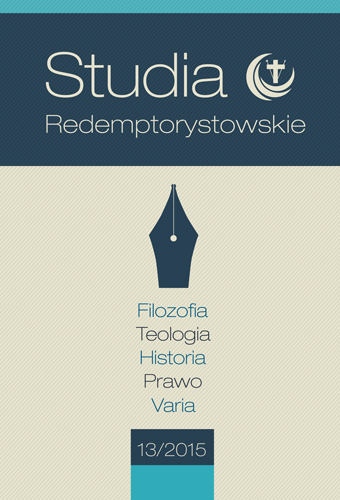
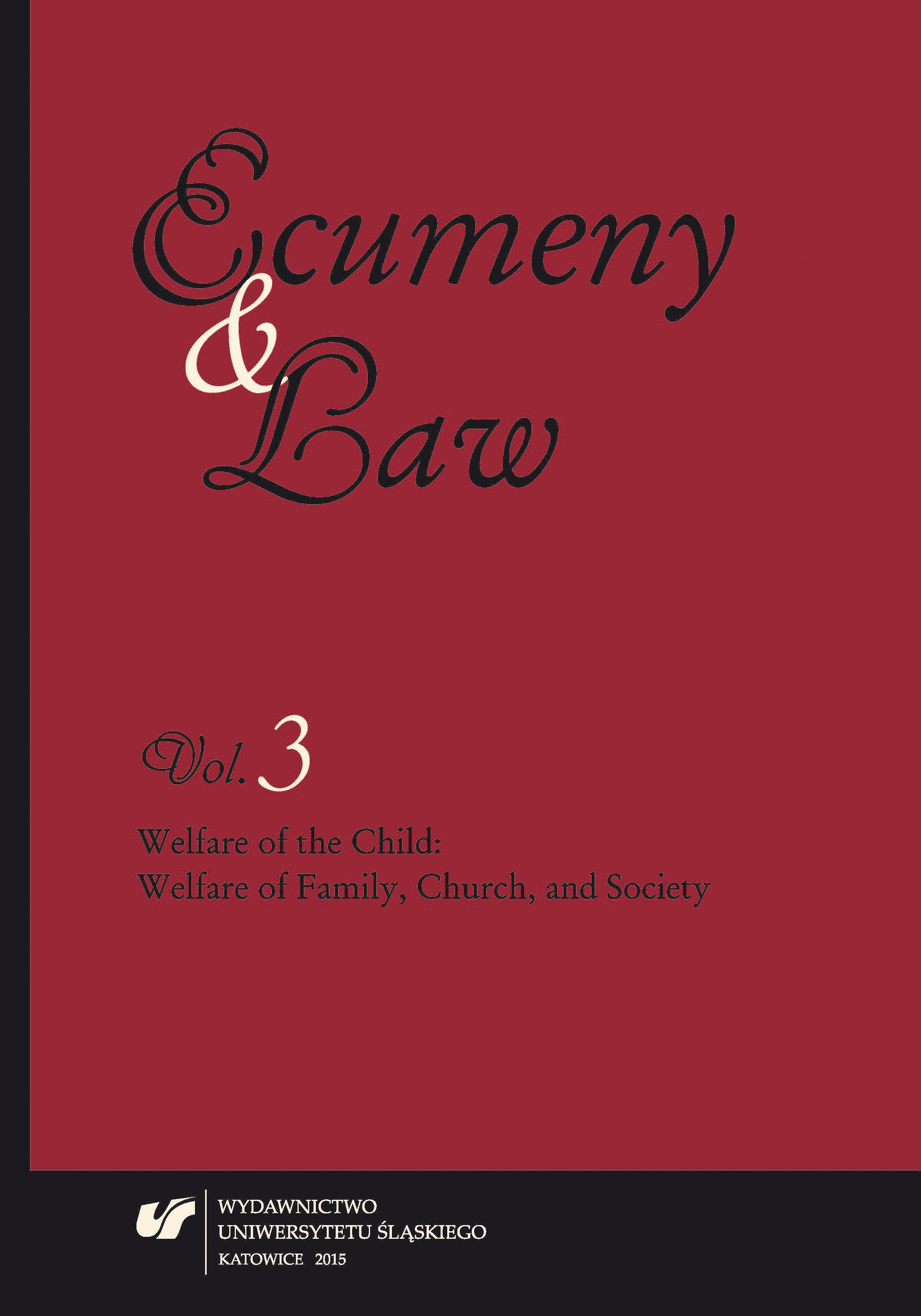
The article presents the interconnectedness between the issues of the good of the child, the child as constituting the good in himself or herself, and the common good of society. It juxtaposes the perspective of personalism and individualism, rights versus duties, goods, and commitments, while linking the issues of freedom and love as fulfilment of freedom. The paper discusses these issues by examples of tendencies towards growing individualism noticed by some authors in changes of American divorce laws, the so-called collaborative reproduction, and in the possibilities of genetic engineering. Arguments quoted or discussed are taken from John Paul II, Helen M. Alvare, Michele M. Schumacher, Mary Ann Glendon, Michael J. Sandel, and Jurgen Habermas. The article calls for the social recognition of the child (and every person) as the common good and points to the social attractiveness of the perspective of giftedness of human nature and social relations exemplified especially in the relation between the mother and the child, which needs to be recognized by various institutions of society.
More...
The article entitled “Roman Catholic-Anglican Mixed Marriages in Ecumenical Dialogue and Pastoral Practice” presents the teachings of the Catholic Church with respect to marriage based on the encyclical of Pope Pius XI “Casti connubi” and apostolic exhortation by John Paul II “Familiaris consortio”. Presenting marriage with its fundamental features: unity, indissolubility, sacramentality, as being a natural union between a man and a woman, blessed by God and empowered to take on matrimonial and parental tasks, constitutes a basis for deliberations on mixed marriages between people baptized in various Christian confessions, in this case Roman Catholic and Anglican ones. The issue of the mixed marriage between people of those two confessions has become an element of works by the Anglican-Roman Catholic International Commission, ARCIC, which in 1975 published a document entitled “Theology of Marriage and Its Application to Mixed Marriage”. Its content became a basis for the presentation of the Anglican vision of marriage in the context of the ecumenical dialogue: points of contacts and differences. Because of schism, out of concern for spouses’ religious identity as well as the unity and stability of marriage, it is necessary to introduce the right rules of pastoral care and confession discipline, which constitute the final part of the presented material.
More...
The hermeneutical analysis of the text of the main regulations and rules of international law regarding the children’s rights, reveal to the reader that they created a set of principles on the Rights of the Child, which have to be taken by the world’s states in their approach undertaken in order to harmonize their national legislation with the international law doctrine of the child. Among others, this article’s reader could also find out that in recent decades the international legislator was constantly concerned to develop new rules and regulations on the children’s rights and on their legal protection; hence the need that the basic principles enunciated by it should not be only known and inserted into the text of national laws, but also respected and applied by practical and concrete measures.
More...
In a situation of considerable unemployment in Poland, the opportunity to go to work abroad allows the poles to get a better job and improve your financial situation. It can be said that it is better to leave and work than vegetate on the spot, with no prospects for development. Migration allows the poles to raise living standards. You can see it build up homes, refurbished homes, new cars, houses equipment. Thanks to the migration of many families rose from misery and stood on their feet. You can’t demonize this phenomenon, because more often than not accompanied by related departure charge strengthens family ties. Inducing a desire to leave the Polish is primarily a heavy situation on the labour market. Lack of work makes a lot of people decide to search for employment abroad. Most people, especially the young, looking for better living conditions, which, in turn, is inextricably linked with the creation of good jobs, giving the opportunity to live at the appropriate level. In Poland, sadly lacking such employers as high unemployment and a lack of prospects for “pushes” the poles to seek work abroad.
More...![„PARAFIA W PRAWIE KANONICZNYM I W PRAWIE POLSKIM”, REDAKCJA SŁAWOJ LESZEK GŁÓDŹ, JÓZEF KRUKOWSKI, MIROSŁAW SITARZ, LUBLIN [2013], TNKUL, s. 293, ISBN 978-83-7306-616-8](/api/image/getissuecoverimage?id=picture_2014_26058.jpg)
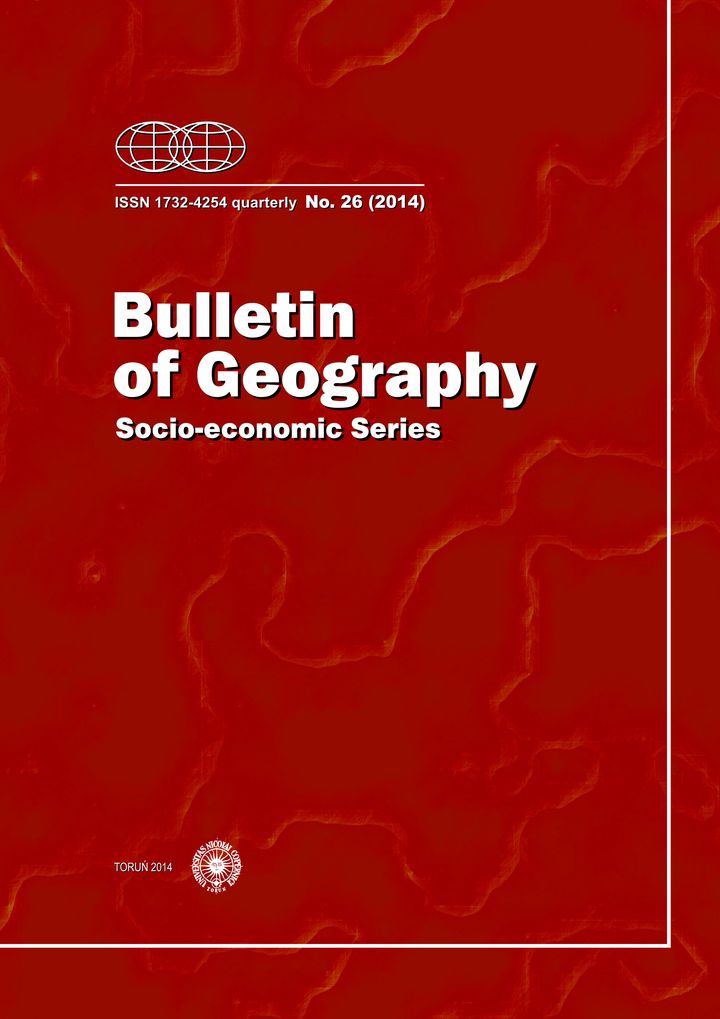
One of the hallmark policies implemented post-apartheid, the Restitutionof Land Rights Act 22 of 1994, is a rights-based program aimed at addressingthe loss of land resulting from past racially discriminatory laws or practices.The aim of this research was to identify what are the factors that determine thedifferent outcomes of the restitution process when claimants are demanding thereturn of land rights and to highlight the challenges regarding the implementationof this land restitution policy. Focusing on two specific yet contrasting areasin Cape Town, Constantia and Kensington, it was determined that due to factorspertaining to the lands in question, the neighborhood surrounding the lands, theclaimants, as well as the organization, function, and performance of different publicentities, the policy has managed to fulfill restorative justice, but has yet to fulfillits ultimate goal of returning land rights to the claimants and undoing the injusticesof the apartheid regime.
More...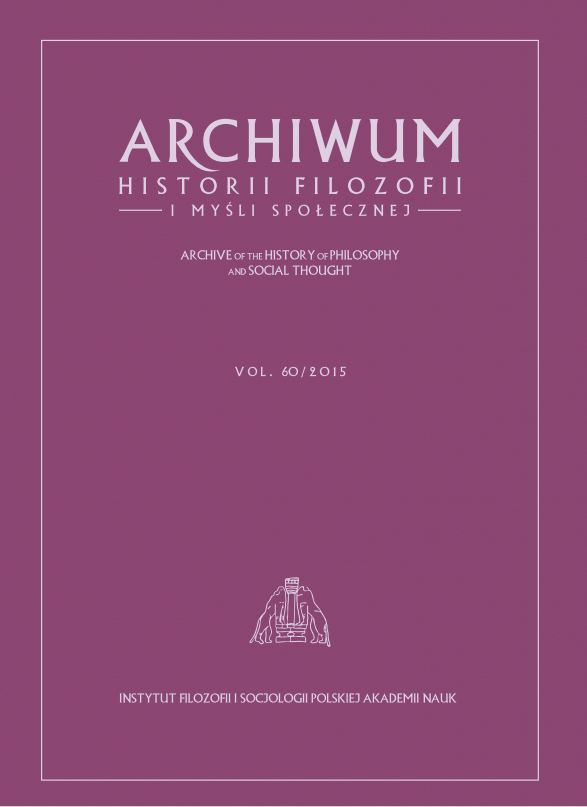
The article analyzes the hypothesis of ideal of love, which was first proposed by Leon Petrażycki. The ideal of love in the works of Polish philosopher and sociologist of law serves as an axiom of practical reason, constituting an order of legal development that will lead to the universal cooperation, not only between members of one society, but among all of humanity. The law was designed to accelerate the moral development of society, through appropriate impact on the psyche of people following rules, and at the same time it should to educate them in the spirit of universal cooperation (morality). Modern research conducted in evolutionary science and primatology seems to confirm some assumptions underlying the ideal of love, but on the same time, they imposed severe restrictions on it. In the first part of the article the concept of the ideal of love is presented, including the role of law and legal policy, which should lead to its achievement. The second part of the article is devoted to the reviewing of the biological roots of morality and its evolution in the light of the work of Frans de Waal. The last part of the paper consists of the evaluation of Petrażycki’s proposal, conducted from the perspective of evolutionary science and primatology, and indication of its advantages and limitations. At the end of the paper reader can find examples of possible applications of the concept of the ideal of love in social and legal practice.
More...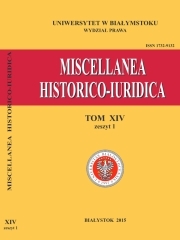
Since its inception the communist forces’ system of military justice had constituted a part of the system of subordinating entire front-line units to the communist rule, and the advancing Sovietisation of the Polish People’s Army. The Soviet communists had their own experience in the fields of enforcing obedience and wide-scale infiltration, including that of the armed forces. Red Army, SMERSH and NKVD officers detached to the PPA and the security apparatus involved, introduced Soviet-inspired police terror and disciplinary tactics in the army, temporarily making use of pre-war symbolism and cynically referring to the tradition of the Second Polish Republic. The judicial practice of courts-martial was aimed at preparing the Polish army and war-weary population to accept the communist ideology, and for clearing the military of those discontented with post-Yalta reality.
More...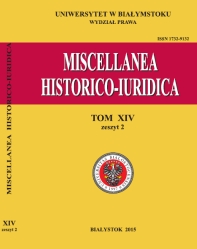
After Poland restored its independence in 1918, the subject of Polish citizenship was regulated by the provisions of international law, particularly those found in the Versailles Treaty of 24 June 1919, as well as by those formulated in the Treaty with Austria signed in St. Germain en Laye on 10. Sept. 1919, those laid down in the Treaty of Riga of 18 March 1921, and additionally, by the provisions of domestic law, namely the provisions of the Statute on Citizenship of the Polish State of 20 Jan. 1920. It was as early as during the work on the aforementioned Statute that there appeared problems that, in the years which followed, became detectable in decisions taken by the Supreme Administrative Tribunal. It was the latter that – within the scope of its competence – controlled the legality of decisions made on the occasion of adjudicating in matters concerned with the application of provisions on citizenship of the Polish state. In the judicial decisions of the Tribunal, which was established in 1922, there dominated those concerned with the certification of citizenship for which there applied the individuals who acquired the citizenship by virtue of law. The Tribunal also frequently decided in matters referring to making an option of citizenship, the option being allowed by the Versailles Treaty. The Tribunal cautiously appraised the proceedings designed to expel an individual from the territory of Poland. What the Tribunal considered to be a defect in the proceedings was inter alia too general a justification of decisions that referred to the refusal of granting citizenship to the person applying for it. Although the doctrine of the time regarded the act of granting citizenship as the decision that the competent organ made within its discretionary power, the Supreme Administrative Tribunal oversaw each case to ensure that the boundaries of the discretionary power were not exceeded. Likewise, in each case the Tribunal considered itself to be the organ that was competent to check the regularity of proceedings. In each case the Tribunal made a penetrating interpretation of provisions and would repeatedly return to the most difficult questions. Among the latter there were inter alia the interpretation of such notions as affiliation with the commune, domicile and the place of settling and military service as titles that justified the acquisition of citizenship. As a result of its control over the administrative practice, the Tribunal managed to reveal many infringements of provisions. This led to the quashing of decisions that were subject to complaints. In this respect the activities of the Tribunal deserve credit.
More...
The professors of law at the Faculty of Law of the University of Vilnius were: Simon Dilger, John George Schauer and Aaron Alexander Olizarowski. On the other hand it raises doubts whether, in accordance with the act of foundation, only one chair of civil law (Roman) were established. Undoubtedly, canon law was taught at the two cathedrals. With high probability, Aaron Alexander Olizarowski also taught canon law. However, all indications are that he could take second chair in civil law (Roman) and lectures on this discipline. It is true that Aaron Alexander Olizarowski also promoted a few doctors of canon law, but in this period Vilnius Academy were other specialists who are likely to teach canon law. In addition, he was a layman, which could also be an obstacle to entrust lectures in canon law. In addition, CV, publications and complete education Olizarowski’s indicate that undoubtedly took a second chair in civil law (Roman) and lectured in this discipline. Having a doctorate both laws was adequate preparation to teach this course. Thus, Alexander Olizarowski, educated abroad, was the only lawyer and the right candidate for the role of professor of civil law (Roman) at the University of Vilnius.
More...
Adam Mickiewicz is regarded as the greatest Polish poet. His works have a timeless value, providing an inexhaustible source of inspiration for subsequent generations of readers. In the works by Adam Mickiewicz, we can find many references to ancient laws, including the famous lawgivers. In the poem Warcaby, the poet notes that lawgivers often did not obey the laws which they themselves had established. He reminds the reader of the story of the Greek ruler Zaleucus, who lived in the 7th century B.C. He punished adulterers with the loss of both eyes. When his own son committed the crime, Zaleucus violated this law. He decided to have one of his son’s eyes taken out and one of his own. Another lawgiver mentioned by Adam Mickiewicz in the poem is Appius Claudius. He was a member of a special commission composed of ten men (decemviri legibus scribundis) who wrote in the years 451–450 B.C. the Law of the Twelve Tables (lex duodecim tabularum). Shortly afterwards, however, he was guilty of violating the law in an attempt to deprive a beautiful plebeian girl, Verginia, of her freedom. Another of the famous lawgivers mentioned by the poet, in his poems Walka miodowa and Jamby [Na imieninach Onufrego Pietraszkiewicza], is byzantine emperor Justinian the Great. In Jamby Adam Mickiewicz mentions the Digest (Digesta), the main part of the codification of the Roman law written during the reign of Justinian. The Digest was published in Latin in 533 A.D., and later translated into Greek, so it’s also known as the Pandects.
More...